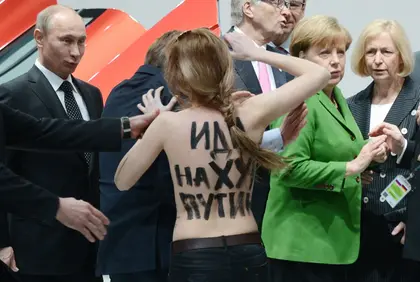International protest group FEMEN turned its unique style of topless activism on German Chancellor Olaf Scholz at the weekend, in opposition to the country’s slow response to eliminating dependency on Russian gas. But who exactly are FEMEN, and what do they hope to achieve?
When Russia launched its full-scale invasion of Ukraine on Feb. 24, Germany’s Chancellor Olaf Scholz had only been in office for little over two months. But he quickly attracted criticism for an apparently cautious approach to reducing his country’s dependency on Russian gas. In doing so, he was slated for seemingly putting Germany’s economic interests ahead of people’s lives in Ukraine in the face of a brutal and belligerent aggressor.
JOIN US ON TELEGRAM
Follow our coverage of the war on the @Kyivpost_official.
On Sunday Aug. 21, activists from protest group FEMEN took advantage of a photo opportunity with the Chancellor at an Open Day event at the German Chancellery in Berlin. Two women ran up to the Chancellor, unzipped their jackets and bared both their chests and their opposition to the country’s stance against Russian gas.
“GAS EMBARGO NOW”, was painted across on the chest of one of the girls, while they both shouted: “No money for Russian gas!” and “Stop financing the war!” while tossing money into the air.
The FEMEN movement organized the protest to highlight the German government’s inaction in the face of Russia’s war in Ukraine. An Aug. 21 statement on the FEMEN website reads:
“The German political appeasement course of the past few years has, of course, led Germany into an energy-economic dependence on Russia. This dependence on Putin’s dictatorial regime, which is now waging a genocidal war against the Ukrainian people, has corrupted our German democracy. The German leadership has let the eyes of the country run into the knife. And while Russia destroys Ukrainian cities and murders civilians, it continues to successfully weaponize its energy. Germany’s role in supporting Putin in his plan is shameful and painfully obvious.”
FEMEN exposed
Founded in Ukraine in 2008, FEMEN currently operates across Europe, with bases in Paris, Berlin, and Hamburg. Its ultimate goal is “complete victory of patriarchy”, and its main tactic is “sextremism,” which it describes as “female sexuality rebelling against patriarchy and embodied in extremal political direct-action events.”
In the 2016 documentary “Ukraine is not a Brothel”, the group said: “We protest against patriarchy in all its forms, and against anything that infringes upon the rights of women.”
FEMEN currently has about 40 activists, with some of its most influential members being Ukrainian women living in Paris. It was founded by Anna Hutsol, along with two friends Oleksandra Shevchenko and Oksana Shachko in their home city of Khmelnytskyi. While the protests often have a political element, both the Ukrainian government and the opposition distance themselves from the movement.
Among the movement’s most famous protests was the 2010 “Ukraine is not Alina” demonstration against the visit of Putin – then Prime Minister of Russia, to Ukraine. In 2013, Shevchenko protested in front of Putin and then-German Chancellor, Angela Merkel. A photograph from the event became one of the year’s best-known news story photos.
On July 26, 2012, a half-naked girl met Patriarch Kirill at Kyiv airport with shouts of “ISIS out” and the inscription “Kill Kirill” on her back.
On July 21, 2017, a FEMEN activist exposed herself to the Administration of the President of Ukraine, during a press conference with the President of Belarus, Aleksandar Lukashenko, and then President of Ukraine, Petro Poroshenko.
In February 2018, FEMEN activist Alisa Vinogradova, “protesting against the bloody regime”, bared her breasts in front of Poroshenko at the annual Vienna Ball.
You can also highlight the text and press Ctrl + Enter



